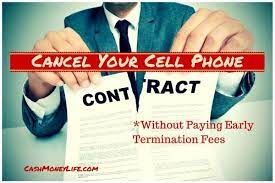Last updated Mar. 12, 2023 by Charles Zemub
Canceling your cell phone contract in most cases can cost you at least $100, depending on your carrier. However, there are legit ways to cancel your phone contract without paying fees. Even though it takes quite an effort, it is possible. So if you are unsatisfied with your phone carrier, paying your way out of the contract isn’t the only solution. Here are 14 ways to cancel your cell phone contract without paying fees.
1. Capitalize on the Grace Period Loophole
The contract on your new phone usually comes with a grace period that allows you to evaluate the quality. In addition, the agreement enables you to test and ensure the device and service meets your specification.
So if you have a new phone or a contract that doesn’t satisfy your needs, you can leverage the grace period to get out of it. Check the fine print to see the duration to end your contract without penalty.
Generally, carriers give at least 14 days (or more) to see if the service meets your needs; some cell phone providers may serve you better than others. It depends on the carrier towers’ location and your home’s structure.
So take full advantage of the grace period and test your phone service around the places you’ll use it. For example, use the phone at home, office, car, in restaurants, in grocery stores, etc.
You need to do this to be sure you won’t suffer terrible reception after the grace period. While it is possible to terminate your contract after passing the initial term, it’s much easier to get out in the first few weeks.
Contact your cell phone carrier if you experience any issues and ask to end the contact. In some cases, the carrier customer service may offer you credits or incentives to stay.
2. Trade Your Contract
Aside from capitalizing on the grace period, there are other options to cancel your cell phone contract without paying fees. One way is to trade or transfer your contract. However, using this idea wouldn’t be as easy as ending it early on, but it is a good way out.
You can ask a family member or friend to see if anyone is open to taking on your contract. The good thing is that it can be done quickly, especially if you contact customer service. You’ll also need to make an Assumption of Liability – for transferring the rest of the contract to the other person.
Before transferring your contact, ensure your bill is current. The other person would be given a copy of the terms and must prove they’ve read it and agree to them. The cell phone carrier may also perform a credit check on the person.
3. Switch to a Cell Phone Provider That Agrees to Pay Your ETFs
Switching to a cell phone provider that’ll pay the termination fees for you is an easy way to avoid paying contract fees. However, this option isn’t available for all carriers. But with some, like Sprint and T-Mobile, for example, it is. In addition, wireless carriers run promotions offering to bail you out if you intend to end your contract early. So you can leverage this opportunity to get out.
However, some companies may not pay entirely for your early termination fees per se. But they’ll give you a substantial amount in credit – which acts as them helping to cover fees from your old provider.
4. Leverage Change in Contract Terms
There’s a chance that any alteration in terms of the contract you signed can give you a way out. Wireless carriers are required to notify customers if they make any changes to the agreement. The revisions could extend the length or increase the cost.
So, you can research to see any recent changes to your contract and have them cancel your contract if there are any. Then, look through your last bills and compare the service charges to check if anything has changed.
Also, you can contact the customer service line and ask if there’ve been any recent changes to your contractual agreement. If there’ve been changes to your contract without your prior knowledge, you may be able to terminate it early without having to pay any penalties.
5. Request for Cancelation of Your Contract When You Move Out of The Service Area
Unlike metropolitan areas, when you move to a more rural location, it can affect your service. So, if you’ve recently relocated out of the service area, you may receive poor coverage from there and wouldn’t require your carrier.
You can use this as a valid reason to end your cell contract without paying early termination fees. However, in some cases, a carrier will provide a mini antenna or tower for your home to boost your signal.
But if you use your phone in places far from your home – like the office or workplace – use it as a reference to show why a tower or antenna won’t work. Also, keep records of dropped calls, poor service, etc., as proof.
You can use all of these as valid reasons to negotiate your way out of your contract. For example, in most cases, military personnel deployed for an extended period can get out for free.
6. Request For Termination of Contract When the Service is Poor
In some cases, users can terminate a cell phone contract without paying fees if the network service is very poor. Therefore, for example, if service is poor regularly, it’s possible to request to end your contract for free.
However, it depends on the agreement of the network you’re using, whether your carrier has an acceptable service guarantee, and if your network’s performance breaks the service guarantee.
So, check the fine print of your contract to see. Even if they’re no provisions to cancel for free, you might pay a discount fee for the affected month. It all depends on the terms and conditions.
7. Take Advantage of the Cooling-off Period
Did you take out your contract online or by phone? You have the chance of a cooling-off period during which you have the option to cancel for free.
You have a 14-day ultimatum in the Consumer Contracts Regulations to change your mind if you want to cancel. Check with your provider to explore your options.
However, if you signed the contract in person (e.g., at a phone store), you may not enjoy the statutory cooling-off period. Again, though, you should check with your provider if they have a cooling-off period offer for in-person purchases.
If they’re provisions to cancel, contact your provider and inform them of your intention to terminate the contract during the cooling-off period. However, if you use the phone during this period, you can still cancel, although it won’t be completely free. You’ll have to pay for the services you’ve already used.
8. Overuse Free Roaming
Nowadays, most cell phone providers offer free roaming services. However, this service isn’t free for them, but they cover most of the charges for their customers. So it’s easier to ignore customer complaints and the flood of calls to the CSRs.
However, most cell phone providers don’t like it when you use roaming minutes for most of the month because it means more loss for them. Generally, you need to place a minimum of 51% of your calls outside your carrier’s area. It’s rare to find such deals nowadays, but they may still apply, depending on your carrier.
9. Negotiate with Your Customer Service
If none of the above works for you, you should consider calling customer service and asking! If you’re a good negotiator, this could work for you. Contact your provider’s customer service and ask them if there’s a way to terminate your contract at no cost.
You’ll need to provide good reasons to end your contract early. However, this option doesn’t always work. Carriers don’t want to lose their customers; they’ll do whatever possible to keep you, even offering other benefits.
So telling them you want to terminate may cause them to want to give you packages to stay. These packages could be a few dollars taken off your bill or even a credit on your next statement. If this option doesn’t work for you, then try other means.
People Also Ask
Is there any way to Get Out of a Phone Contract?
Yes, there’s a high chance you’ll have to pay a cancellation fee if you end your phone contract early. To cancel, contact your provider to inform them of your intention to terminate the contract. Then, you can email, call or send a free text.
If you’re still within the contract, you’ll need to buy out the remainder of your agreement or pay an exit fee before you can leave. On the other hand, if you’re out of contract, you have the liberty to switch providers whenever you like. However, if you want to cancel your phone contract without paying fees, then try a different strategy, like transferring your contract to a friend or family who needs it.
How Can You Get Out of a Phone Contract Without Paying?
You can request the cancelation of your contract when you move out of the service area. That way, you’ll have a genuine reason to cancel and won’t have to pay for the termination. Another way to get out of a phone contract without paying is to request for termination of the contract when the service is poor. Most carriers will oblige in other to protect their reputation and not escalate matters.
Also, you could try negotiating with customer service and explain why you need to cancel. Then, you can ask them for a way out without paying any cost. If they insist you pay, try negotiating for bonuses like rea duction of the service fee or a few dollars taken off your bill. Since they are bent on keeping their customer, they’ll agree.
How Can I Get Out of My Phone Contract Early?
You can easily cancel your phone contract early if you’re still in the Cooling-off Period. The cooling period of 14 days offers you the chance to cancel your contract and ask for a refund. However, if you’ve started using the phone, a fee could be taken from your refund for the service you’ve used.
The cooling-off period could be extended in the situation when your phone provider didn’t give you specified information, such as details of a right to cancel. So make sure to check the fine print to see what has been sent by the company during the time of purchase.
Frequently Asked Questions
What are the Five Ways to Terminate a Contract?
A contract can be terminated by consent or agreement by either of the parties or both. In addition, there are diverse ways in which a contract can be closed, such as on the bases of the impossibility of performance (frustration), on completion, breach, rescission, termination by prior agreement, novation of contract, or force majeure.
What Are the Seven Ways an Offer Can Terminate?
According to US law, a contract can be terminated by expiration or lapse of the offer, rejection by the offeree, a counter offer by the offeree, a conditional or qualified acceptance by the offeree, a revocation of the offer by the offeror, and, by operation of law.
What is The Most Common Way to Terminate a Contract?
The most common way of terminating a contract is by issuing a written notice at least 30 days before the termination date. Once the party has provided the reason for ending the contract, they must give prior notice to the other party with their intentions. That way, the other party can be prepared to defend, accept or move on.
How Can frustration terminate a Contract?
A contract may be terminated on the bases of frustration when an unexpected situation occurs after the agreement of the contract, which renders it commercially, emotionally, or physically impossible to fulfill. In this situation, the party can be discharged immediately, nullifying the contract.
Can a Contract be Terminated at Any Time?
Yes, it can. By law, the standard way to terminate exists if there has been a breach of contract. For example, if one party refuses or fails to meet their minimum contractual obligations. The right to terminate is available for all parties involved, regardless of a termination clause.







